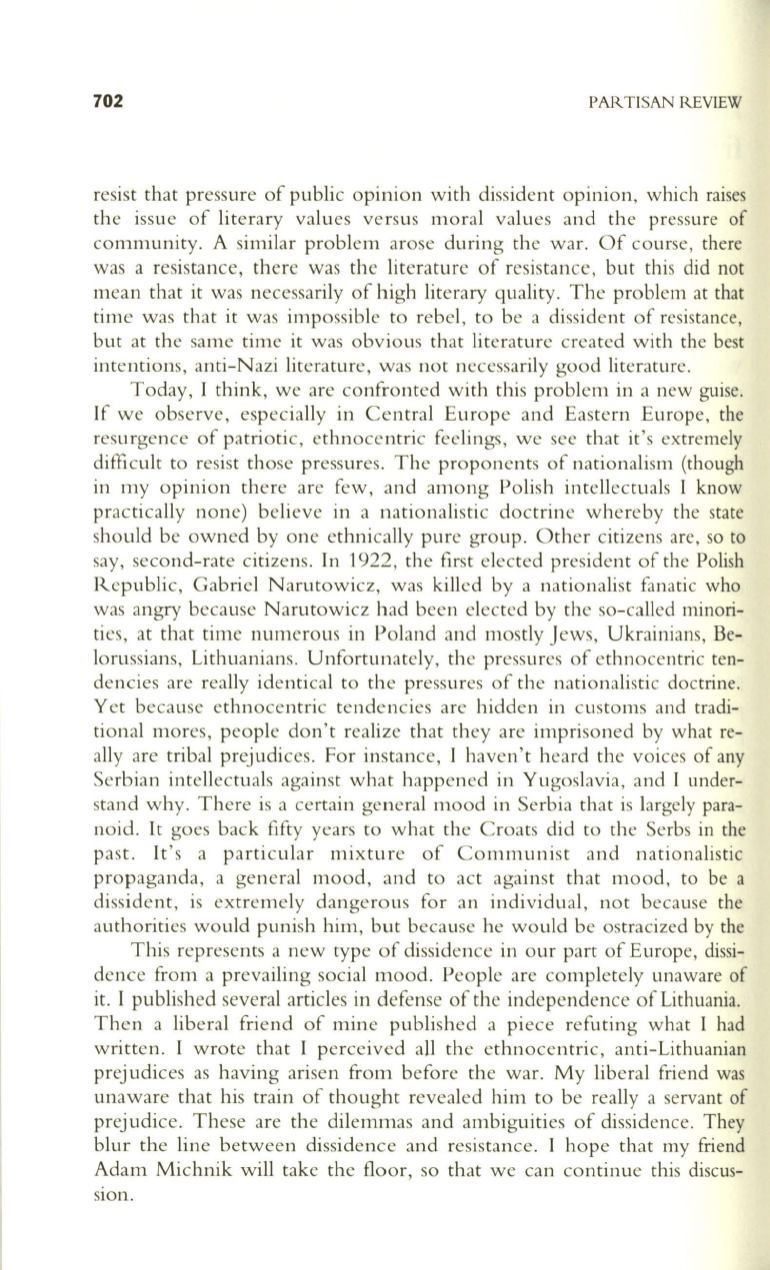
702
PARTISAN REVIEW
resist that pressure of public opinion with dissident opinion, which raises
the issue of literary values versus moral values and the pressure of
community. A similar problem arose during the war. Of course, there
was a resistance, there was the literature of resistance, but this did not
mean that it was necessarily of high literary quality. The problem at that
time was that it was impossible to rebel, to be a dissident of resistance,
but at the same time it was obvious that literature created with the best
intentions , anti-Nazi literature, was not necessarily good literature.
Today, I think, we are confronted with this problem in a new guise.
If we observe, especially in Central Europe and Eastern Europe, the
resu rgence of patriotic, ethnocentric feelings , we see that it's extremely
difficult to resist those pressures. The proponents of nationalism (though
in my opinion there are few, and among Polish intellectuals I know
practically none) believe in a nationalistic doctrine whereby the state
should be owned by one ethnically pure group. Other citizens are, so to
say, second-rate citizens. In 1922, the first elected president of the Polish
Republic, Gabriel Narutowicz, was killed by a nationalist fanatic who
was angry because Narutowicz had been elected by the so-called minori–
ties, at that time numerous in Poland and mostly Jews, Ukrainians, Be–
lorussians, Lithuanians. Unfortunately, the pressures of ethnocentric ten–
dencies are really identical to the pressures of the nationalistic doctrine.
Yet because ethnocentric tendencies are hidden in customs and tradi–
tional mores, people don't realize that they are imprisoned by what re–
ally are tribal prejudices. For instance, I haven't heard the voices of any
Serbian intellectuals against what happened in Yugoslavia, and I under–
stand why. There is a certain general mood in Serbia that is largely para–
noid. It goes back fifty years to what the Croats did to the Serbs in the
past . It's a particular mixture of Communist and nationalistic
propaganda , a general mood, and to act against that mood, to be a
dissident, is extremely dangerous for an individual, not because the
authorities would punish him, but because he would be ostracized by the
This represents a new type of dissidence in our part of Europe, dissi–
dence from a prevailing social mood. People are completely unaware of
it. I published several articles in defense of the independence of Lithuania.
Then a liberal friend of mine published a piece refuting what I had
written. I wrote that I perceived all the ethnocentric, anti-Lithuanian
prejudices as having arisen from before the war. My liberal friend was
unaware that his train of thought revealed him to be really a servant of
prejudice. These are the dilemmas and ambiguities of dissidence. They
blur the line between dissidence and resistance. 1 hope that my friend
Adam Michnik will take the £loor, so that we can continue this discus–
sion.


